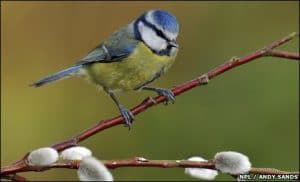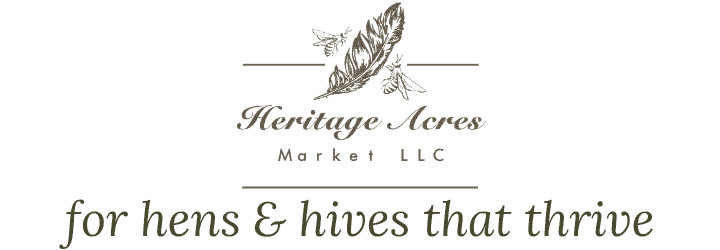Table of Contents
Are herbs in your chicken coop worthwhile?
Nest box herbs. These beautiful blends of brightly colored herbs look gorgeous and promise for “more relaxed hens” and to “support broody hens”, with claims of pest control, worming and increased egg production. But are they really worth the hype or are they a modern day snake oil? You might be surprised.
It is becoming more common to find aromatherapy and essential oils in our everyday life. However humans are not the only ones that seek out herbs for their health benefits. Numerous articles in scientific journals have noted the use of medicinal herbs by various birds throughout the world.
International Research

Corsican blue tit
The most studied example is the Corsican blue tit. Blue tits have been found to add lavender, mint, yarrow, curry, lemon balm and aster to their nests, and continue to do so until the chicks fledge. [5] In experiments where researchers removed herbs from 64 nests, the birds quickly replaced them, usually in less than 24 hours.
The overall finding was a decrease in parasites and bacteria living on the blue tit chicks, and an increase in feather growth rates.[2][3]
In 1999 a laboratory test was performed, testing the blue tit blend of herbs and its repellant factor on mosquitoes. They found that the combined mixture did significantly repel mosquitoes (the results of the study can be found here).
A 2004 study found that birds intentionally added antimicrobial plants that prevent feather degrading bacteria, with “several types of plant materials and extracts including usnic acid, ascorbic acid, yarrow, and two oak species inhibited the growth of a number of harmful bacteria.”[4]
In 2005, tests on the blue tits involved researchers removing the herbs added by the birds in select nests, and replacing them with inert moss or another blend of herbs. After two weeks the chicks were tested and found that babies in the herb infused nests had fewer bacteria on them than the non herb nests. A separate study showed that the aromatic herbs improved chick growth and overall health.[6]
Starlings
Starlings use their sense of smell to seek out yarrow, goutweed, hogweed, elder, cow parsley and white willow to add to their nests. These chicks have an increased immune system and live in nests with reduced bacterial load.[2]
An in depth study on Starlings found less bacteria on chicks in herb laden nests than nonherb counterparts, and fledglings from the herb nests had higher body mass.
Additionally, the number of fledglings declined significantly in the nonherb nests, with herbed nests having more chicks survive. In the Starling study scientists found no quantifiable decrease of mites in the herb nest, but overall the chicks were healthier, which indicated that the herbs counteracted the effect of the mites through (possibly) immunostimulants. [7]
Indian house sparrows were found to use leaves from the neem tree in their nests in order to reduce the parasitic load. [9]
Impressive Results
It has been widely proven that the addition of these blends help combat flies, lice, fleas, mice, ants, internal parasites, bacteria, fungus, promote overall immune health, and seem to be preferred by the hens.
Herbs can also be added to dust baths and brooders, or fed directly to the birds. Plus, it looks and smells pretty, adding a little something extra when gathering eggs and tending to your birds.
Which Herbs Benefit Chickens?
Basil
- Discourages flies [1]
- Repels moths and other pests [10]
- Antimicrobial
- Mucous membrane health [16]
- Increases orange egg yolk [16]
- Respiratory health
- High protein
Bay Leaves
- Pest deterrent, antimicrobial, anti-fungal [14]
- Immune system booster [16]
Borage
- Wards away insects and worms [10]
Calendula (or Marigold)
- Deters mosquitoes and snakes [13]
- Stimulates egg production [15]
- Increases orange color of egg yolk
- Stress reliever
- Increased circulation [16]
Chamomile
- Soothing, calming [15]
- Highly bioavailable calcium [15]
Catnip
- Insect repellant, mosquito repellant [10]
- Provides vitamins A, B1, B2, B3, B5, B6, B9, B12 and C [15]
- Reduces internal parasites [16]
Cayenne
- Deters mice, snakes and insects [13]
Cinnamon
- Repels ants [10]
- Repels pests [10]
- Antibacterial and antiworm [12]
- Repels lice, mites, mosquitoes, snakes [13]
- Promotes respiratory health [16]
Clove
- Deters ants, flies, lice, mites, mosquitoes, snakes, spiders [13]
Comfrey
- Provides protein, B12, potassium, calcium and amino acids [15]
- Increases orange color of egg yolk [15]
- Aids in digestion and bone health [16]
Dill
- Inhibits growth of bacteria, yeast and mold [10]
- Deters flies [13]
- Reduce stress [15]
- Encourages feather growth [16]
- Promotes respiratory health [16]
Garlic
- Widely known for its use as a wormer and repels mosquitoes and ticks [1]
- Antibacterial activity against Staphylococcus, Streptococcus, Proteus, Pseudomonas, Mycobacterium, Escherichia coli, Salmonella, Clostridium, Klebsiella, Bacillus subtilis [12]
- Antifungal (Candida, Cryptococcus, Trichophyton) and fights parasites such as (Giardia lamblia, Entamoeba histolytica,Trypanosomes, Leishmania). [12]
- Antiviral against influenza A and B, cytomegalovirus, rhinovirus, HIV, herpes simplex virus 1 and 2, rotavirus, and some species that cause pneumonia [12]
- Deters ants, mites, spiders [13]
- Stimulates egg production [15]
- Increases feed conversion [16]
Ginger
- Discourages intestinal worms [12]
- Antibacterial
- Parasite prevention [16]
Lavender
- Insect repellant [10]
- Antimicrobial [12]
- Repels ticks, spiders, moths, mosquitoes, mites, mice, lice, fleas and ants [13]
- Soothing, relaxing, calming [15]
- Increases circulation [16]
Lemongrass
- Source of citronella oil [2]
- Deters flies, mosquitoes [13]
Marjoram
- Increases egg production [15]
- Detoxifier [16]
- Anti-Inflammatory [16]
Peppermint/Spearmint
- Insect repellant [10]
- Antimicrobial [12]
- Deters moths, mites, mice, lice, flies, ants, spiders [13]
- Eases fatigue
- Respiratory health [16]
- Encourages feather growth [16]
Nasturtium
- Increased egg production [15]
- Antiseptic, antibiotic [16]
- Repels pests
- Anti-parasitic
Neem
- Pesticidal and germicidal properties, insect repellant [10]
Nettle
- Several vitamins and nutrients [17]
Oregano
- Fights salmonella, coccidia, avian flu and infectious bronchitis [15]
- Antibiotic, promotes respiratory health [16]
Parsley
- Increases egg production [15]
- Vascular health
- High vitamin content [16]
Patchouli
- Insect repellant, often used in the east to scent bed linens, keeping fleas at bay [10]
- Deters fleas and moths [12]
Pennyroyal
- Repels mosquitoes, ticks and fleas. You could fill cloth tubes with pennyroyal for a homemade flea collar [10]
- Repels rodents and insects [12]
Red Clover Blossom
- Stimulates egg production [15]
- Promotes respiratory health [16]
Rose
- High in Vitamin C15
- Antioxidants [16]
Sage
- Anti-parasitic [12]
- General health promoter [16]
Sweet Woodruff
- Repels moths and flies [1]
Tansy
- Discourages ants and flies [1]
- Natural pesticide and flea deterrent [12]
Tarragon
- Insect repellant [10]
- Promotes general health [16]
Thyme
- Repels ants, lice, mites, mosquitoes [13]
- Promotes respiratory health [16]
Yarrow
- This powerhouse herb comes up in nearly every scientific article
- Antibacterial
- Anti-inflammatory
- Increased respiratory health [16]
- Stress reducer
- Insecticide [3]
Wormwood
- Strong insect repellent [10]
This information is not intended to diagnose, treat, cure, or prevent any disease. Always consult your veterinarian before using such products
Sources:
- http://www.motherearthnews.com/organic-gardening/organic-pest-control-zmaz86jazgoe.aspx?PageId=1
- http://blog.nature.org/science/2016/06/20/self-medication-wildlife-style-how-birds-creatures-medicinal-plants/
- http://people.eku.edu/ritchisong/birdnests.html
- https://www.sciencedaily.com/releases/2004/05/040527080935.htm
- http://www.sciencemag.org/news/2002/07/perfumed-nests-corsican-birds
- https://www.livescience.com/5767-birds-line-nests-natural-antibacterials.html
- http://link.springer.com/article/10.1007%2Fs10336-005-0012-x
- http://www.evolutionhumaine.fr/michel/publis/pdf/lafuma_2001_behav_processes.pdf
- https://books.google.com/books?id=HHUe3pChrPQC&pg=PA31&lpg=PA31&dq=birds+use+herbs+in+nest&source=bl&ots=k37uwSmFx4&sig=9Yv1zo22jFVAAIGyZDCQh2K-9v8&hl=en&sa=X&ved=0ahUKEwjvtuiqzcbOAhUE7yYKHdLDA004ChDoAQhEMAY#v=onepage&q=birds+use+herbs+in+nest&f=false
- https://www.mountainroseherbs.com/
- https://www.herbco.com/
- http://www.herbco.com/t-herbs-infection.aspx
- http://www.fresheggsdaily.com/2012/04/natural-pest-control.html
- http://medicinalherbinfo.org/herbs/Herb-index.html
- http://countrysidenetwork.com/daily/lifestyle/home-remedies/healing-herbs-list-for-your-flock/
- http://abundantpermaculture.com/how-to-herbify-your-chickens-like-lisa-steele/
- https://permacultureglobal.org/post_projects/3797

kitchenhutt spices
Monday 8th of May 2023
Thanks for sharing this with us !!